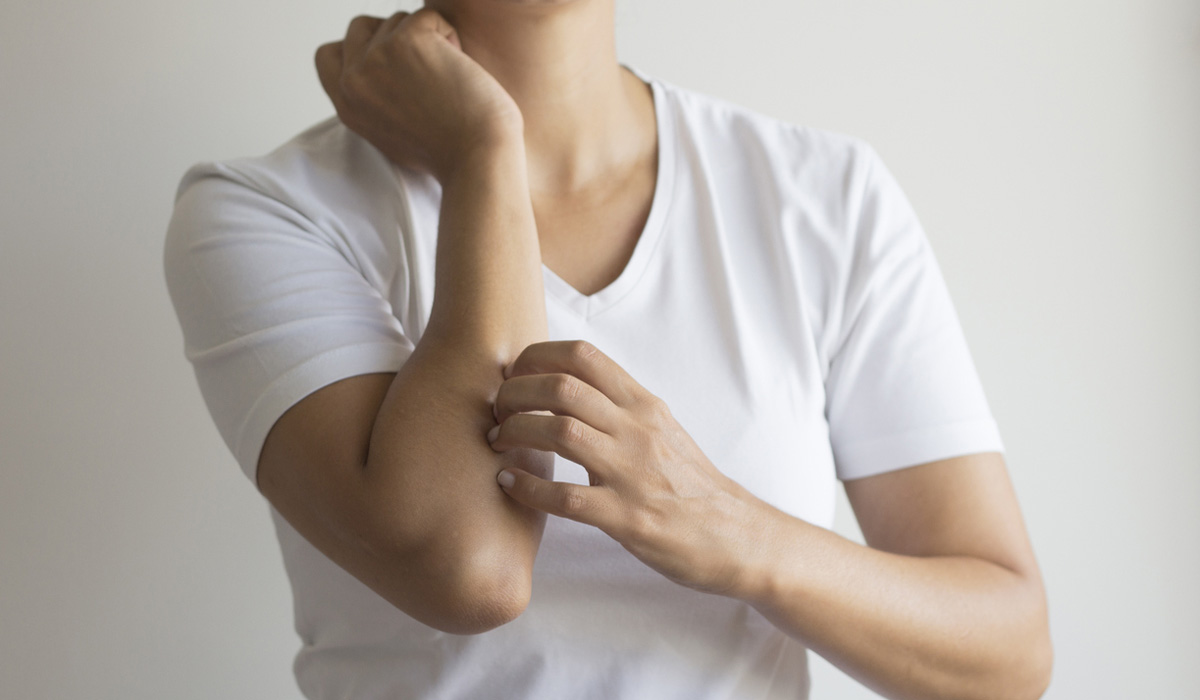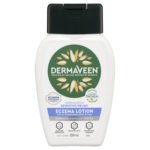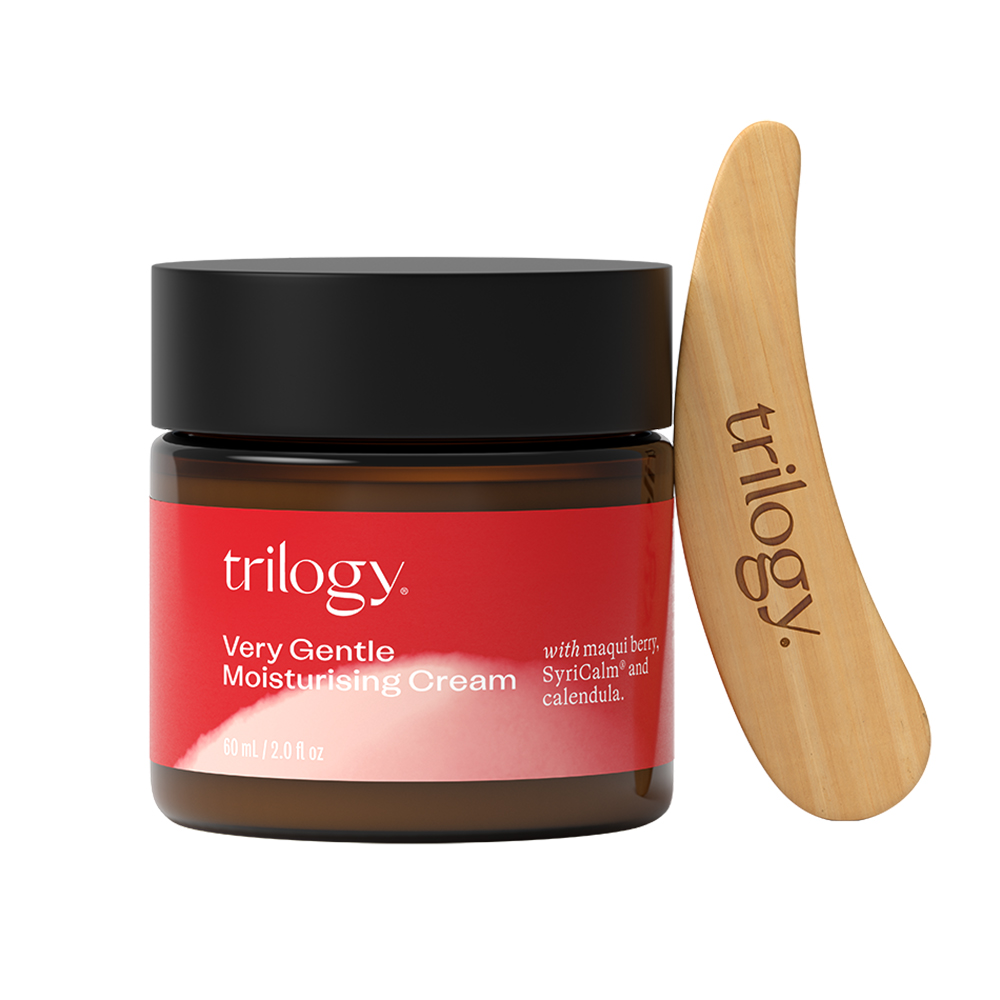If you’re feeling a little extra itchy during the colder months, you might be encountering an eczema flare-up. With the cold winter air being drier than normal, eczema flare-ups can be more prevalent than during the summer season. So what can you do prevent eczema in winter?
RELATED: The right way to fake tan in winter
RELATED: Can you really escape eczema?
Well, the answer is – you can’t completely prevent eczema, as it’s a chronic condition. But there are things you can do to make eczema flare-ups less common or easier to manage in winter. We spoke to Jenny Bui, Avène’s Scientific Communication Manager, to find out how.
What is eczema and why is it prevalent in winter?
“Eczema, also known as atopic dermatitis, is a chronic condition characterised by skin that is dehydrated itchy and inflamed,” explains Jenny. “Genetic factors are linked to physical abnormalities in the skin barrier, imbalance of good and bad bacteria on the skin, and an overactive immune system which causes these symptoms.”
Now that you know what it is, let’s figure out why you might be experiencing it a little more often in winter. It turns out there are a number of factors that can cause an eczema flare-up, but most often in winter you’ll find that it’s due to the changes in humidity and overall temperature.
“As temperatures drop, so does the humidity of the air. This means that the air is very dry in winter,” says Jenny. “Low humidity, which is very dry air, causes you to lose moisture from your skin to the atmosphere. This will therefore make your eczema worse and increase the likelihood of a flare-up.”
But if you’ve been trying to combat these changes by sitting in front of a heater all day, guess what – you’re probably making it worse. “Heaters and central heating cause the air indoors to become even more dry. Increased heat overall also increases evaporation of water from your skin to the environment,” says Jenny. “Sudden changes from cold outdoor environments to indoor dry environments can also aggravate your skin as it needs to adapt to the changes in temperature.”
How can I avoid eczema flare-ups in winter?
You might feel as if all of this is pretty unavoidable seeing as a lot of these triggers, such as the weather, are out of our control. But Jenny says that there are things you can do to keep eczema flare-ups at bay in winter.
Avoid/control indoor triggers
“Especially when you are more often indoors due to the cold weather, you are surrounded by allergens such as pet dander and dust mites. Keep pets out of the bedroom, wash sheets and blankets regularly, invest in dust-mite proof covers for your pillows and mattress, remove carpets.”
Avoid overheating
“Increased temperatures cause your skin to dry out. It may be tempting to have hot showers and baths in winter, but you need to avoid this! Instead use tepid to warm water. Always use a soap-free body wash, and remember not to rub your already sensitive skin with a towel, always pat dry. And don’t stay too close to sources of heat, such as heaters, fireplaces, avoid electric blankets.”
Watch what you wear
“Naturally you would want to dress warmly in winter but be careful not to overheat yourself. It is ideal to wear layers of breathable, cotton clothing rather than heavy layers, to allow you to remove your clothing and to adjust your body temperature as needed. Materials such as wool can also irritate the skin and increase flare-ups, so these should be avoided where possible.”
I’ve got an eczema flare-up – how can I manage it?
So you’ve got the itch and you’re desperate to manage it. Lucky for you, there are a few things you can do to deal with it and make living with eczema in winter a little easier.
“Flare-ups occur when your skin is inflamed, red, itchy and can become cracked and broken. Your skin is also more susceptible to infections during this time,” says Jenny. “Topical steroids are the safest and most effective treatment for all age groups, by controlling the inflammation. Topical steroids such as hydrocortisone 1% cream or ointment can be applied directly onto the affected areas. This is over the counter and can be obtained after assessment by a pharmacist, or depending on the age, location and severity of the flare up, you may be referred to your doctor.”
These topical steroid creams and ointments should be applied liberally to the area each day until the flare-up has completely healed – which can take up to a few weeks. Once the affected area has healed, you can work to hydrate the skin barrier in an effort to reduce the frequency and severity of future winter flare-ups.
“You must vigilantly moisturise twice daily, even when your skin feels good. However, you must never apply moisturisers to the area of the flare-up until it has completely healed. In winter, you can use an even thicker moisturiser than you normally would,” explains Jenny.
So what should your winter anti-eczema routine look like? Well, it involves dedication and a few good products to be used religiously. It’s important to note that even with the right products, if you suffer from eczema, you’ll still experience flare-ups – but these products can help to reduce the severity and duration of winter eczema flare-ups.
Cleansing
When it comes to cleansers, Jenny recommends choosing soap-free cleansers, body washes and oils. “Cleansers must always be soap free. Soap strips the skin of the moisture that patients with eczema already have a deficit in. Products containing irritating ingredients such as fragrances and alcohol should also be avoided.”
bh loves:Avène XeraCalm A.D. Lipid-Replenishing Cleansing Oil, Nutri-Synergy NS Sensitive Skin Cleanser, Billie Goat Soap Original Soap, Dr LeWinn’s Private Formula Sensitive Cleansing Milk.
Moisturising
Your moisturiser is your skin’s saviour in winter! Keep your skin moisturised by applying a gentle but effective moisturiser a few times a day. “You need to moisturise daily twice daily and straight after a bath or shower to maintain moisture in the skin and help prevent evaporation of water into the atmosphere,” advises Jenny. “In winter due to the dry air, you will need to do this more often. This will help reduce dryness and itch, and therefore help prevent flare ups. Ointments are the most effective moisturisers as they are thick and occlusive, thereby helping to retard water loss from your skin. As a general rule, thick ointments and creams are more effective than thin lotions.”
bh loves:Grahams Natural C+ Cream, sebamed Body Lotion, NATTo Tea Tree & Lavender Skin Therapy, DermaVeen Sensitive Relief Eczema Lotion, Trilogy Sensitive Very Gentle Moisturising Cream.
Do you have eczema? Are you prone to winter flare-ups?










oh no goats milk – yuck! poor thing freaky! I tasted that once. Yeh foot milk – good explanation. My daughter at school would get it behind the knees too.
That’s really interesting Mayy. Am mentioning that to my daughter. She tends to also have to keep the cat out of her room but it’s not the only thing – stress, going well with her asthma, clothing that irritates etc can be some of hers.
It is interesting. I will mention that to my daughter (or just show her this whole article with comments!). I tend to ban dairy myself but for very different reasons to eczema.
omg you must love summer!!
ohhh no. You are in a bit of a predicament redbatz!
My daughter’s is worse when her asthma is better and vice versa.
I’m in a similar boat in the way that I’m a mum of a daughter that gets it.
I will mention this to my daughter – sounds good and we have some of that around here too.
Yeh I need to show my eldest daughter this as she does get eczema – I used to feel so bad for her when she was little – actually I still do even now she’s 23!!
Im hearing a lot about this brand of late.
I don’t get eczema but I relate to the dryer skin in winter and have been lavishing The Body Shop budy butters on lately. They’ve been doing the trick for me.